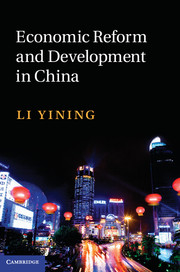Book contents
- Frontmatter
- Contents
- Li Yining: Biographical Note
- Preface to the Cambridge Edition
- Preface
- Foreword
- 1 The role of education in economic growth (1980)
- 2 Effective and rational investment under socialism (1982)
- 3 Basic thoughts on economic restructuring (1986)
- 4 A tentative study of socialist ownership structure (1987)
- 5 Two types of disequilibrium and the mainstream of current economic restructuring (1988)
- 6 Relationship between economic reform, growth and industrial restructuring (1988)
- 7 Laying a solid foundation for new culture (1989)
- 8 Cultural economics: a tentative study (1990)
- 9 Environmental protection and compensation to victims of environmental damage (1990)
- 10 Coordinating economy and environment in less developed regions (1991)
- 11 Comparative economic history and the modernization of China (1993)
- 12 Growth and fluctuations in economic disequilibrium (1993)
- 13 Property rights reform of rural enterprises (1994)
- 14 Rationality and proportionality in income distribution (1994)
- 15 Meshing fiscal policy with monetary policy (1997)
- 16 The dual foundations of efficiency (1998)
- Glossary
- Index
7 - Laying a solid foundation for new culture (1989)
- Frontmatter
- Contents
- Li Yining: Biographical Note
- Preface to the Cambridge Edition
- Preface
- Foreword
- 1 The role of education in economic growth (1980)
- 2 Effective and rational investment under socialism (1982)
- 3 Basic thoughts on economic restructuring (1986)
- 4 A tentative study of socialist ownership structure (1987)
- 5 Two types of disequilibrium and the mainstream of current economic restructuring (1988)
- 6 Relationship between economic reform, growth and industrial restructuring (1988)
- 7 Laying a solid foundation for new culture (1989)
- 8 Cultural economics: a tentative study (1990)
- 9 Environmental protection and compensation to victims of environmental damage (1990)
- 10 Coordinating economy and environment in less developed regions (1991)
- 11 Comparative economic history and the modernization of China (1993)
- 12 Growth and fluctuations in economic disequilibrium (1993)
- 13 Property rights reform of rural enterprises (1994)
- 14 Rationality and proportionality in income distribution (1994)
- 15 Meshing fiscal policy with monetary policy (1997)
- 16 The dual foundations of efficiency (1998)
- Glossary
- Index
Summary
The topic of my speech today is the relationship between economic reform, new public ownership, and a new culture. In my opinion, when we clarify the relationship between these three things, we will gain a better idea about the significance of and prospects for the economic reform that has been going on in our country for a whole decade, and find it a lot easier to understand the trials and tribulations our nation has gone through in the course of it.
The study of people
In studying economic issues we are obliged to face certain questions. What is the purpose of growing the economy? For whom do we provide products, labor, and service? Why should we turn out more and more products and provide more and more labor and service? These questions boil down to one: What is the purpose of production? Common sense tells us that production per se is not the purpose. Human beings do not live in the world merely as laborers. People do not come into this world to serve production – it is production that serves people. The purpose of production is for people to be better cared for and better educated. It defeats the purpose of production if we concentrate single-mindedly on offering more products while our standard of living and cultural and educational attainments remain the same, and if our people are not duly respected and cannot live up to their potentials.
- Type
- Chapter
- Information
- Economic Reform and Development in China , pp. 119 - 136Publisher: Cambridge University PressPrint publication year: 2012



